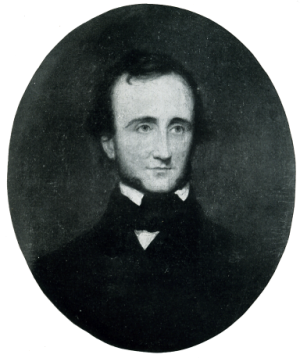140.
"People don't realize what a treasure you are. What kind of
country is this that allows its greatest man of letters to be destitute? What
kind of a system—"
While he was flattered by this praise, Eddy wasn't up for socialist rant. He needed breakfast.
Suddenly he felt motivated again. "In Richmond, wait and see, I will be a new man!"
As if Fate agreed, when Eddy, Lippard, and Burr
arrived at the depot the next day, his valise and trunk were there, behind the
counter. When he looked through them, however, he could not find his lectures.
The men who wanted him dead must have stolen them, but why? His optimistic mood
evaporated. Before boarding the train he held Lippard's hand for a lingering moment. "Give my best wishes to John Sartain," Eddy said. "Have a drink with him, and toast me then. To Edgar Poe, may he rest in peace."
"None of that, now. We will drink to your health.
Now go find Elmira."
In Richmond, Eddy was
sitting at a desk in his room at the Swan Tavern, feverishly trying to recreate
his lost lecture. The missing manuscripts had caused him so much stress he had
binged in August, resulting in the usual week-long debilitation. The doctor told him another such attack would
kill him. Now he was drinking only coffee, which made his heart flutter.
The heart beats ten and intermits. Elmira was already charmed by her childhood
sweetheart. He still had enough of the southern gentleman in him, enough of his
Richmond upbringing to summon the gallantry she required. And she retained a
hint of the rare beauty he had captured in a pencil sketch when she was
fifteen, those bright eyes now darkened and somewhat stern, the gently pursed
lips now prim with frown lines, her long black locks now in a bun. She had
become more religious since he had known her. When he first showed up at her
door, she was about to go to church. His unannounced presence did not detain
her, but there was no question that she was delighted to see him, when she
returned from services. They sat in her parlor, Eddy all in black but with a
violet flower on his lapel.
"You and Virginia were newlyweds the last time I
saw you, Edgar. I was so sorry to hear of her passing, especially up there in
the frozen north."
"I was devastated by her death, it’s true, but
life must be lived, Elmira, not merely endured. You got my letters; you
know I'm here to court you. I remember sensing that you
were jealous when I married Virginia, even though you were married to Mr.
Shelton, married to the man your father forced upon you. You still loved me!"
"You could tell I was in agony, couldn't you? Wishing I were in . . . Virginia's place. But I managed to
banish those poisonous reptile thoughts of mine, those evil temptations, and
was relieved when you left Richmond. Yes, Edgar, I loved you still. I'll always love you." Suddenly they were embracing, kissing.
Elmira was pious like Loui but passionate like
Helen. She still actually desired him. She will be thoroughly disappointed
on that score, thought Eddy. The last time he had even attempted erotic
lovemaking was with Fanny Osgood, and he had failed rather miserably. But he
felt that if anyone could rekindle him it would be Elmira, the first woman he
had physically desired.
So things were
looking up. He got the fifty dollars Patterson had sent, and started gathering
subscribers. He managed not to drink and even attended a meeting of the Sons of
Temperance. The healthier he felt the surer he was that Circe would not return.
She had not appeared on the train nor did she materialize in his room. That
fact alone helped him feel better. Although he could use her right now
as he tried to rewrite his lecture, the way she used to perch upon his
shoulder, enabling his vision if not actually dictating, always able to knock
off his writer's block. But now, alone, nothing came. He gave
up.
I'll give the lecture without a manuscript. Elmira
will be there, she'll inspire me. He'd given the same lecture in Providence in front
of Helen. One widow for another. And he made the same promise to Elmira that he'd made to Helen, taking it one step further.
This time he actually joined the Sons of Temperance and signed a pledge that he
would never drink again. It was so public it appeared in all the papers—in several cities. And he was so proud of
himself he sent a copy of his pledge to Muddy in mid-September, a couple of
days before his lecture. Every time he wanted a drink he drank strong coffee,
too much of which gave him fibrillations so bad he thought he could hear his
heartbeat, or was that Circe purring? Has she come to be near me at the
moment of release? Let my heart be still a moment . . . .
|

